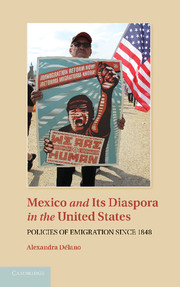Conclusions
Sending States' Emigration Policies in a Context of Asymmetric Interdependence: Limits and Possibilities (2006–2010)
Published online by Cambridge University Press: 05 July 2011
Summary
Mexico's emigration policies, including the state's engagement with the diaspora, the discourse in relation to emigrants, the responses to U.S. policies and legislation affecting Mexican emigrants, as well as the priority given to the issue in the national and bilateral agendas, have undergone a significant change. This is particularly the case since the mid-1980s. From a history of generally limited engagement in terms of responding to U.S. policies and a traditional interpretation of consular protection activities, Mexico has gradually developed more active policies and has begun a process of redefining its position on migration. The argument developed here that these changes are tied to transformations taking place at the domestic, transnational, and international levels supports existing claims about the need to study states' emigration policies based on a multilevel analysis (Østergaard-Nielsen, 2003). Without disregarding the importance of the domestic and transnational processes, which have been more widely studied, in this analysis I have emphasized the influence of changes at the international level.
I have highlighted the importance of the process of economic liberalization that paved the way toward NAFTA and the learning process implied, which led the Mexican government to a more complex and multifaceted understanding of the U.S. system and to redefine its foreign policy discourse and strategies. This was reflected in Mexico's more active pursuit of its interests in relation the United States without being restrained by the fear of creating conflict in the relationship, as was traditionally thought.
- Type
- Chapter
- Information
- Mexico and its Diaspora in the United StatesPolicies of Emigration since 1848, pp. 231 - 252Publisher: Cambridge University PressPrint publication year: 2011



